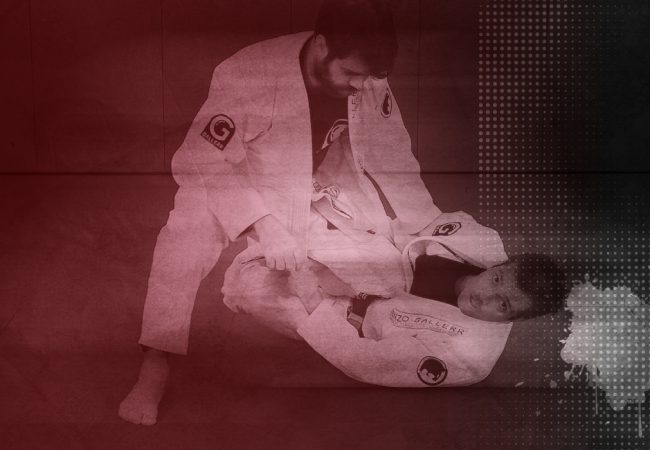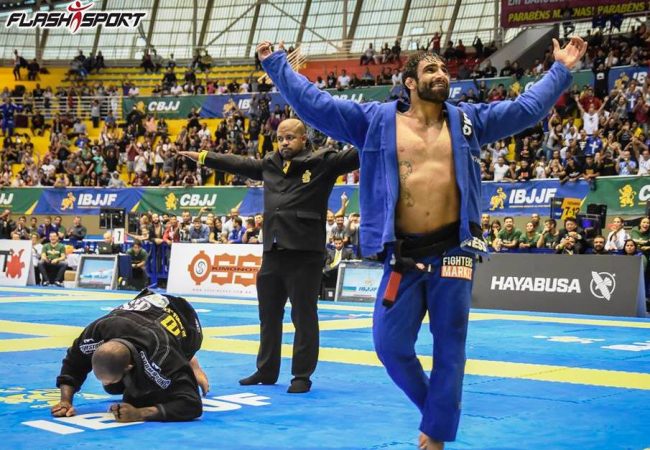“Everyone has their story, their moment. You shouldn’t diminish or enhance anybody’s story,” said a shy, but always accurate, Roger Gracie in a conversation with Graciemag this week, analyzing the title of “greatest BJJ in the world” in the view of many teachers.
Even though he is pointed to as the Pelé of the gentle art, Roger reiterated that there are no secrets to his game. Lots of training, focus and a mind fixated on the greater goal of BJJ dictated the pace of his career during his twenty years as a competitor. On a visit to Kléber Buiu’s gym, Gracie Barra Parque Olímpico, Roger spoke about his progressive game, the great fighters he wishes he had fought, and the sort of unwavering focus we should all strive to have on and off the mats.
Transcript:
“All of my main adversaries I had throughout my career, I fought them multiple times. I fought Xande eight times. I fought Jacaré six times. I fought Rominho two or three times. I consider Rominho a training partner, not an adversary, but it happened that we both landed in the final. I fought Buchecha twice.
“I never fought Rodolfo Vieira. I never fought Lo. I had the desire to fight them, but, you know, that ship has sailed. I think the day I decided to retire, I won’t step on the mats again. My focus is a different one now. I have other goals in my life. But despite never having fought them… I think an athlete always has the desire to fight the best. They are great athletes of BJJ; they always remained at the top. But that’s that — the people I had to fight, I fought them.
“Looking back, in every year of my career, I evolved as an athlete. I got my black belt when I was 21. I was very young. In my first Worlds, I got to the absolute final and lost to Pé de Pano, who was my training partner. And, each year, I think I was bettering myself technically. This was very important in my career as an athlete — I never stopped bettering myself. In the beginning, I managed to get submissions here and there. In my first Worlds, I think I didn’t get a single one. Every fight was hard.
“I arrived in the black belt a novice. There were many world champions there, far advanced in front of me. I arrived with desire and determination to better myself as an athlete. And in spite of the setbacks I had in my career, I never let myself be shaken in any way. I would always return to the gym the next day and focus on the following year. The following year would pass and I would focus on the next one, until the end of my career. Regardless of titles, I had my personal goal, to be the best athlete I could be.
“I think every defeat I had in my career helped me. They made me the athlete I am today. Maybe without that, I wouldn’t have made it as far as I did. I don’t see myself as doing basic BJJ. BJJ, to me, is a progressive martial art. I think there is a goal in the fight. I think my goal in a fight I the vision I have of BJJ, it’s the progressive vision. Whatever position you’re in — If you’re standing, your goal is to take your opponent down. If you land in the guard, your goal is to pass. If you pass, your goal is to mount and finish. My focus is always this. If I’m on the bottom, I want to sweep. Regardless of finishes along the way. That can’t be the goal. I think it’s not a matter of basic BJJ or modern, complicated BJJ.
“Many athletes don’t see BJJ in a progressive way. They get stuck in a situation along the way. They want to create, to develop a different situation, and I think that’s great — but that can’t be where BJJ ends. Their focus can’t be on that situation. BJJ is progressive — it has a beginning and an end. The end is the finish, but you won’t finish from the guard. I’m not gonna pull guard and have my objective be to stay playing guard trying to finish or sweep. I think my vision of BJJ is different from that of many other athletes. Where I try to go — that’s the difference I see between my BJJ and that of many others. I’m sure there are many athletes that see it the same way I do, but my focus is the end — the finish from the mount, or from the back if he tries to get out. That’s the end of BJJ, where there is nowhere else to go. Once you mount, there is no more progression — it’s the submission.
“I think what has changed in my life is my focus. Because, for my entire life, my focus was to be an athlete, to prepare in order to fight. And I did that for over twenty years. So nowadays, the focus is to focus on other things: I want to focus on my school. I want to expand, to open new ones. I want to focus on other projects. I think what’s most important is to maintain the focus and discipline I had in my life as an athlete for other things. The big problem for an athlete of any sport is that once they retire, they are left not knowing what to do. They are unable to put the focus they had when they used to fight or compete in their sport into some other thing. So much so that you see many athletes go off the deep end. They get involved with drugs, they lose themselves a bit. So I’m using the focus and discipline I had in my fighting for other things.”




